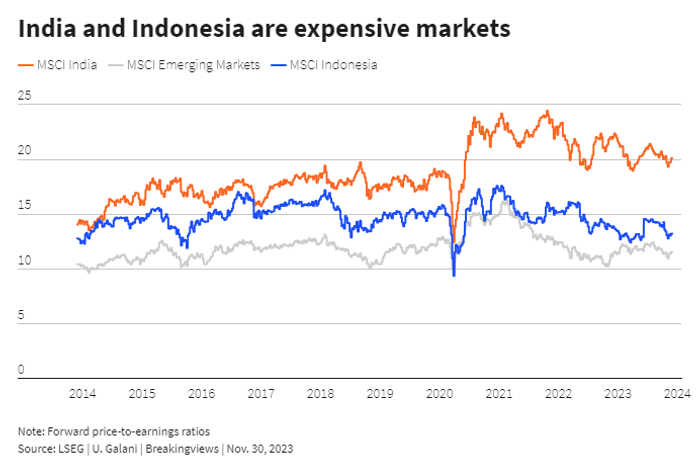Published 14:44 IST, December 18th 2023
Polls may imperil emerging Asia’s policy stability
Chinese CEOs are also looking hard at these countries as domestic growth slows and labour costs rise.
- Republic Business
- 3 min read

All change. A predictable, business-friendly environment is a rare find in emerging markets. India and Indonesia have enjoyed this elusive commodity, more or less, for roughly a decade under leaders Narendra Modi and Joko Widodo, respectively. With elections coming up, the political stability governing some $4.7 trillion worth of GDP will come under question.
Voters among the 1.7 billion people in the two Asian behemoths will go to the polls in 2024. The results will be watched closely by foreign executives and investors who are trying to reduce their dependence on China and cut risks in their supply chains. Together India and Indonesia account for almost 18% of the MSCI Emerging Markets Index, more than double the level 10 years ago. Chinese CEOs are also looking hard at these countries as domestic growth slows and labour costs rise.
A change of president is guaranteed in Jakarta. Jokowi, as he is popularly known, has reached his term limit and cannot stand for re-election. But his son is the running mate of Defence Minister Prabowo Subianto, a two-time presidential loser who is chasing the top job again. That joint ticket is both favourite and controversial: Jakarta suffered some of the worst civil unrest in years in 2019 after Prabowo initially refused to concede defeat following elections that handed Jokowi a second term.
Jokowi’s successor will have big shoes to fill. Foreign direct investment into Indonesia, at $45 billion, is at a 20-year high and the government’s industrial policy is embedding nickel-rich Indonesia into the global supply chain for electric vehicles. Chinese companies now dominate the country’s smelting capacity, however. At least one presidential candidate, Jakarta Governor Anies Baswedan, might be inclined to pivot Southeast Asia’s largest economy towards the United States, though he is not a frontrunner in the race.
Modi remains firm favourite to win in India and results released in December from state polls suggest robust support for his ruling party. Yet the country could see the return of a messy coalition government if his Bharatiya Janata Party is unable to win an outright majority for a third consecutive term. Policymaking could get bogged down in petty squabbles in this scenario, as it was before he came to power in 2014, even though politicians across the divide broadly agree on the economic path forward. Corruption could soar too. Annual foreign direct investment into India has already fallen back down to 2018 levels and any sign of political upheaval could scare off companies waiting on the sidelines to invest.

The world has obsessed about geopolitics for some time. As the focus also zeroes in on domestic politics, both countries’ markets are priced to perfection and assume some continuation of the status quo. The MSCI India Index was near a record high as of Dec. 3, trading at 20 times earnings, while the MSCI Indonesia Index was at 13 times, above the wider emerging market benchmark’s 12 times forward valuation. That leaves plenty of room for disappointment.
Author: Una Galani, Anshuman Daga
Updated 16:05 IST, December 18th 2023